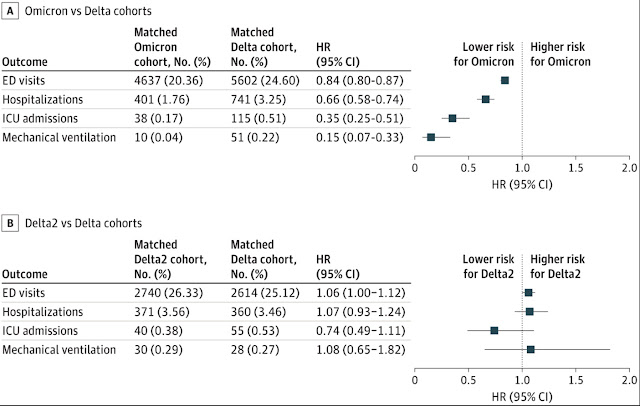Research Letter
Incidence Rates and Clinical Outcomes of SARS-CoV-2 Infection With the Omicron and Delta Variants in Children Younger Than 5 Years in the US
...We used the TriNetX Analytics Platform to access aggregated and deidentified electronic health records of 90 million patients from 66 health care organizations. TriNetX built-in analytic functions permit patient-level analyses while only reporting population-level data. Patients represented 28% of the US population from 50 states covering diverse geographic, age, race, income, and insurance groups.3 Self-identified race and ethnicity were included owing to their association with SARS-CoV-2 infection risk and outcomes.
The study population contained 3 cohorts of children younger than 5 years with no prior SARS-CoV-2 infection: (1) Omicron cohort, who contracted SARS-CoV-2 infection between December 26, 2021, and January 25, 20224; (2) Delta (B.1.617.2) cohort, who contracted SARS-CoV-2 infection between September 1, 2021, and November 15, 20214; and (3) Delta2 cohort, who contracted SARS-CoV-2 infection between November 16 and November 30, 2021.4 Delta2 cohort was developed to control for later time periods and shorter infection window.
Here are the results:
While infection with omicron was 66% (2/3) as likely to result in a hospitalization for kids under age 5, omicron infections led to only 35% as many ICU admissions, and only 15% as many kids needing mechanical ventilation. In other words, while earlier variants led to rare serious illness and death in young children, current variants lead to much rarer serious illness, and therefore deaths, than the earlier strains.
Omicron variants provide even less reason reason to vaccinate young children than earlier variants.
Furthermore, in the 5-11 age group, according to data from the NY Department of Health, based on an extraordinarily comprehensive dataset of 365,000 vaccinated 5-11 year olds, and about 750,000 unvaccinated children the same age, the vaccine only prevented cases for a few days. By 7 weeks after the second shot, efficacy at preventing infections had fallen to 12%--only 1 in 8 children benefited.
After seven weeks, efficacy dropped into negative territory: vaccinated 5-11 year olds were MORE likely to get COVID than the unvaccinated children.
So, if you vaccinated your children, you got some protective benefit for a few weeks, and then your children developed increasing susceptibility to infection. We don't know how long the increased susceptibility lasts.
Please do not subject your precious small children to the world's largest vaccine experiment--for which vaccine harms exceed benefits for most recipients, especially when they are children.



















No comments:
Post a Comment